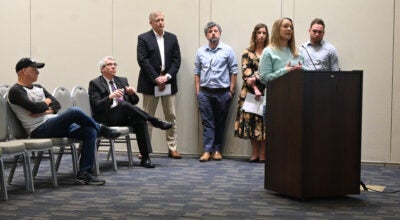Biz Roundup: Chamber unveils theme for Total Resource Campaign
Published 12:00 am Sunday, August 1, 2021
SALISBURY — The theme for this year’s Rowan County Chamber of Commerce Total Resource Campaign is “Having Fun in ‘21!”
The campaign, which kicks off on Aug. 9 at 5 p.m. during a Business After Hours mixer, will run through Sept. 17 and is an opportunity for the chamber to raise funds and bring in new members.
The campaign will promote the idea of visiting local, eating local and buying local.
“This year’s campaign will highlight our community attractions as we come out of the pandemic and the need to support our local business community” Brad Walser, chair-elect and campaign chair, said in a news release. “Business leaders will be dressed to have fun in the community with tourist attractions, arts and cultural events and recreation attire.”
The chamber’s goals for this year’s campaign are: 50 new members; 90% retention of first year renewals; 10% Tiered Benefit Members for 2021 investments and $5,000 in non-dues revenue.
Walser has selected a great group of team captains: Sharon Baker (Integro Technologies); Dr. Eric Hake (Catawba College); Carrie Hanneman (F & M Bank); Desiree Dunston and Bryson Boyd (Novant Health Rowan Medical Center); Elia Gegorek (Gegorek & Associates Realty LLC / Minority Business Council); Donna Groce (Trinity Oaks); Scott Cozart (Rowan-Cabarrus Community College); Dr. Andrew Smith (Rowan-Salisbury Schools) and Dr. Orlando Lewis (Livingstone College).

Chamber Campaign Team Captains – (back row; left to right): Andrew Smith, Bryson Boyd, Brad Walser, Scott Cozart, Sharon Baker, Eric Hake, Orlando Lewis; (front row; left to right): Elia Gegorek and grandchildren; Donna Groce, Elaine Spalding, Carrie Hanneman, Erica Church. Photo submitted.
Each team captain has recruited 10 team members to assist them.
After the kickoff, all campaign volunteers will participate in sales training sessions to learn about new benefits and services. The Sales Training sessions are Aug. 10 at 4 p.m. or Aug. 11 at 8:30 a.m. The campaign runs through Sept. 17 with prizes being awarded at the chamber’s Sept. 20 board meeting.
Prizes will be awarded for all the volunteers participating. The top producer will win a “Be An Original” package valued at over $2,500. In addition, there are some perks for all new members who join during the campaign.
The chamber’s mixer and campaign kickoff is free and open to members and interested business people who are thinking about joining the chamber. For more information contact the Rowan Chamber at 704-633-4221 or info@rowanchamber.com.
Ball Corporation announces investment in Cabarrus County beverage production hub
The global aluminum beverage packaging company Ball Corporation will invest $383.8 million and join Red Bull and Rauch’s beverage manufacturing hub in Cabarrus County, Gov. Roy Cooper announced last week.
The beverage production facility will be built at The Grounds at Concord — site of the former Philip Morris plant.
“We believed throughout this recruitment that Ball would be the third piece of this historic economic development package and we are delighted it has been confirmed,” Cooper said in a news release. “We’re excited that there will be even more available good paying jobs in the Cabarrus County area.”
Headquartered in Colorado, Ball Corporation is a global leader in supplying recyclable aluminum packaging for beverages and aerosols. Since its start in 1880, the company has grown to more than 60 production facilities and 21,500 employees around the globe.
Ball will manufacture aluminum cans for Red Bull and other customers in a new, 800,000 square foot state-of-the-art operation. With Ball’s commitment, the three companies at the new beverage manufacturing hub will create more than 600 jobs and an investment exceeding $1 billion by 2027.
“The beverage manufacturing campus in Cabarrus County is now a billion-dollar operation with the addition of Ball,” N.C. Commerce Secretary Machelle Baker Sanders said in a statement. “This is a powerful illustration of the opportunities and confidence that growing companies have in North Carolina’s resilient economy, robust infrastructure and diverse manufacturing workforce.”
The North Carolina Department of Commerce led the state’s efforts to support Ball’s decision to locate to North Carolina. The average annual salary for all new positions is $70,555, creating a potential annual payroll impact of more than $15.5 million per year. Cabarrus County’s overall average annual wage is $41,255.
Ball’s expansion will be facilitated, in part, by a Job Development Investment Grant (JDIG) approved by the state’s Economic Investment Committee.
Over the course of the 12-year term of the grant, the project is estimated to grow the state’s economy by more than $1 billion. Using a formula that takes into account the new tax revenues generated by the 220 new jobs, the JDIG agreement authorizes the potential reimbursement to the company of up to $3,084,000 spread over 12 years.
Payments for all JDIGs only occur following performance verification by the departments of Commerce and Revenue that the company has met its incremental job creation and investment targets. JDIG projects result in positive net tax revenue to the state treasury, even after taking into consideration the grant’s reimbursement payments to a given company.
Because Ball is locating in Cabarrus County, classified by the state’s economic tier system as Tier 3, the company’s JDIG agreement also calls for moving as much as $1 million into the state’s Industrial Development Fund – Utility Account. The account helps rural communities finance necessary infrastructure upgrades to attract future business.
Even when new jobs are created in a Tier 3 county such as Cabarrus, the new tax revenue generated through JDIG grants helps more economically challenged communities elsewhere in the state. Rowan County could benefit from the utility account, since it is currently a Tier 1 county, the most-distressed label.
In addition to Ball’s investment in Cabarrus County, the North Carolina Railroad Company is investing in rail infrastructure required for operations at a new beverage manufacturing campus.
The North Carolina Railroad Company is investing $700,000 to assist in the rehabilitation of the company-owned portion of the lead track that will connect to the North Carolina Railroad and be served by Class I freight provider Norfolk Southern.
“We are excited to welcome Red Bull, Rauch and Ball Corporation as new customers on the North Carolina Railroad, and we commend their transformative vision for the conversion of the site from a former cigarette manufacturing plant to the production location of a next generation consumer product,” NCRR President and CEO Carl Warren said in a news release. “The new beverage manufacturing operations will result in a substantial increase in the number of railcars on the NCRR line each year and will be a significant boost to the area economy.”
Waterworks Visual Arts Center announces new board members
SALISBURY — Waterworks Visual Arts Center welcomes four new members to its board of directors.
Located at 123 E. Liberty St. downtown, Waterworks Visual Arts Center was founded in 1959 and has been nationally accredited by the American Alliance of Museums since 1999. It is one of only twelve accredited art museums in North Carolina. Its mission is to provide diverse opportunities in the visual arts for all people through exhibitions, education, and outreach programs.
Newly elected to serve three-year terms on the museum’s board are Dr. State Alexander III, executive assistant to the president and vice president of communications and public relations at Livingstone College; Debbie Hoffman, art educator and teacher; visual artist Pamela Sofley; and Sarah White-Harvey, financial applications manager for Dover Corporation.
- State Alexander III.
- Debbie Hoffman.
- Pamela Sofley.
- Sarah White-Harvey.
“We are thrilled to welcome these four new members to the Waterworks Visual Arts Center Board of Directors,” Waterworks Executive Director Anne Scott Clement said in a news release. They each bring a spirit of civic pride, along with talents and expertise to strengthen Waterworks as a significant community and regional resource.”
Re-elected for a second term is Dan Powell, Jr., president of SALCOA Contracting, Inc. At-large board members include Earl Givens, Jr., dean of learning resources at Catawba College; Deborah Lucas, MD, diagnostic imaging physician at the Salisbury VA Hospital; and MT Sidoli, retired social worker.
On July 21, the Board of Directors of Waterworks Visual Arts Center elected officers for 2021-22. Ed Hull, retired executive and community leader, enters his second term as board president, along with Bruce Wilson, owner of Fine Frame Gallery, as first vice president, and Danny Powell as vice president of facilities. Kathleen Bergeron, an independent marketing, public relations and business communications consultant, will serve as vice president of finance and Deborah Lucas as secretary.
Waterworks is grateful to the board members whose terms ended in June: Taylor Durham, immediate past-president and Megan Ferden, Secretary, and co-owners of The Lettered Lily Design Studio; Sharon Forthofer, resident artist at Rail Walk Studios & Gallery; and Jeff Wetmore, vice-president of finance and market executive and senior vice president, Fidelity Bank of NC.
“Their professional expertise and leadership has been instrumental in fulfilling Waterworks’ mission and strategic goals,” Clement said.
Waterworks is funded by individual memberships, corporations and businesses, private foundations, the city of Salisbury, and Rowan County.
The Institute of Museum and Library Sciences, a federal grant-making agency dedicated to creating and sustaining a nation of learners by helping libraries and museums serve their communities, supports the Waterworks Visual Arts Center. Waterworks also receives general support from the North Carolina Arts Council, an agency of the NC Department of Cultural Resources, and from the National Endowment for the Arts.
More information can be found online at www.waterworks.org.
Rowan County ranks among top areas for food processing in North America
SALISBURY — For the first time, Rowan County is rated among the top 10 metro areas in North America in food processing, earning the No. 7 ranking.
That’s according to Business Facilities Magazine, which recently released its 17th Annual Rankings Report.
“Rowan County is primed for growth in the AgBiosciences and we’re proud to receive national recognition for our food processing potential,” Rod Crider, Rowan Economic Development Commission president, said in a news release. “This showcases the foundation set by companies like Food Lion and Cheerwine, as well as the opportunities ahead with the addition of the NC Food Innovation Lab nearby. We can’t wait to see what’s ahead for food processing in Rowan County.”
Brampton, Ontario claimed the top spot in food processing, followed by Fayetteville, Arkansas at No. 2, Dallas County, Texas at No. 3, Los Angeles County, California at No. 4, Magic Valley, Idaho at No. 5, Gloucester County, New Jersey at No. 6 and Rowan County at No. 7. The top 10 was rounded out by Fulton County, Georgia, Oswego County, New York and Finney County, Kansas.
The Rowan EDC recently published an AgBioscience Brochure highlighting the successes and opportunities available in the area.
Small Business Administration opens streamlined PPP loan forgiveness portal
The Small Business Administration recently launched a streamlined application portal to allow borrowers with Paycheck Protection Program loans $150,000 or less through participating lenders to apply for forgiveness directly through the SBA.
“The SBA’s new streamlined application portal will simplify forgiveness for millions of our smallest businesses – including many sole proprietors – who used funds from our Paycheck Protection Program loans to survive the pandemic,” Administrator Isabel Casillas Guzman said in a news release. “The vast majority of businesses waiting for forgiveness have loans under $150,000. These entrepreneurs are busy running their businesses and are challenged by an overly complicated forgiveness process. We need to deliver forgiveness more efficiently so they can get back to enlivening our Main Streets, sustaining our neighborhoods and fueling our nation’s economy.”
The new forgiveness platform will begin accepting applications from borrowers on Aug. 4.
Lenders are required to opt-in to this program through https://directforgiveness.sba.gov. In addition to the technology platform, the SBA is setting up a PPP customer service team to answer questions and directly assist borrowers with their forgiveness applications.
Borrowers that need assistance or have questions should call 877-552-2692, Monday-Friday, 8 a.m. – 8 p.m.
“This initiative will allow PPP borrowers to put their concerns of achieving full forgiveness behind them and focus on operating and growing their businesses again,” Patrick Kelley, associate administrator for SBA’s Office of Capital Access, said in a news release. “We are pleased to be able to assist financial institutions across the U.S. in processing forgiveness applications for small business owners.”
Overall, the SBA and lenders have worked to originate over 11.7 million loans totaling nearly $800 billion in relief to over 8.5 million small businesses.
In 2021, the SBA approved over 6.5 million loans totaling over $275 billion. The average loan size was about $42,000, compared to $101,000 in 2020 and 96% of loans went to businesses with fewer than 20 employees, compared to just 87% in 2020. Also, 32% of loans went to businesses in low- and moderate-come communities, compared to just 24% in 2020.
Over 600 banks have opted in to direct forgiveness, enabling over 2.17 million borrowers to apply through the portal.
Established by the CARES Act in 2020, the PPP was among the first COVID-19 small business economic aid programs and provided more than $798 billion in economic relief to small businesses and nonprofits across the nation.
Other SBA programs include Economic Injury Disaster Loan (EIDL), EIDL Advance, Targeted EIDL Advance, Supplemental EIDL Advance, Restaurant Revitalization Fund, Shuttered Venue Operators Grant, and SBA Debt Relief program. To learn more about these programs, please visit www.sba.gov/relief.
Local Government Federal Credit Union announces addition to Central Piedmont Advisory Council
The Local Government Federal Credit Union has added Stacy McGlamery, administrative assistant for Iredell County, to its Central Piedmont Advisory Council, which includes Alexander, Iredell, Rowan, Cabarrus, and Davie counties.
McGlamery will be an integral part of LGFCU’s volunteer-driven initiative to educate people on the benefits of credit union membership and relay feedback to the board of directors regarding available/potentially available products and services, delivery of service and member needs.
Advisory council members, who represent the philosophical character of the credit union and contribute their time without compensation, function as LGFCU’s eyes and ears throughout the state, serving as liaisons between credit union members and non-members and LGFCU management.
Atrium Health receives equity of care award for equitable COVID-19 response
The American Hospital Association presented Atrium Health with the 2021 Carolyn Boone Lewis Equity of Care Award for outstanding efforts to advance equity of care to patients.
The Carolyn Boone Lewis Equity of Care Award is an annual recognition of exceptional efforts among hospitals and health care systems to spread lessons learned and integrate diversity, inclusion and equity into all aspects of operations.
The award was presented last week to Atrium Health President and CEO Eugene A. Woods at the annual AHA Leadership Summit. Carolyn Boone Lewis was the first African American and first hospital trustee to chair the AHA Board.
“Thank you to the AHA for recognizing the 70,000 extraordinary individuals in our Atrium Health family who work tirelessly every day to eliminate health disparities and meet the health, housing and food needs of our less fortunate neighbors and friends across the southeast region,” Woods said in a statement. “While we are proud of the progress we’ve made, there is so much more work to be done. We are just getting started and won’t stop until we eliminate health disparities permanently.”
The AHA award recognized Atrium Health for its success in applying data, with an equity focus, to its COVID-19 response. This included testing more than 25,000 community members for COVID-19 through a roving testing model, which utilized mobile health units to reach underserved communities with limited access to testing.
Leveraging community relationships, Atrium Health partnered with more than 50 host sites in underserved neighborhoods deemed Public Priority Health Areas with high COVID-19 infection rates and the highest health and quality of life disparities.
“As places of healing, hospitals have a vital role to play in ensuring each person can reach their highest potential for health, regardless of background, ZIP code or any other factor. The Carolyn Boone Lewis Equity of Care Award acknowledges the leaders that make diversity, inclusion and equity foundational to their operations,” AHA President and CEO Rick Pollack said in a statement. “Atrium Health has confronted disparities in health outcomes with renewed urgency during the COVID-19 pandemic. We congratulate Atrium Health and the honorees for using rigorous, data-informed strategies to help bring about change that is much-needed and long overdue.”
Atrium Health has used this same data-driven approach to bring thousands of vaccinations to underserved communities as part of its “Community Immunity For All” collaborative.
Launched in January 2021, Community Immunity For All has a goal to acknowledge the history of health injustice in communities of color, listen to and collaborate with partner organizations, and educate and support individuals in making informed decisions to best protect their health and well-being.
“Early on in the pandemic, Atrium Health began gathering and reviewing data to determine communities in Charlotte disproportionately affected by COVID-19, in order to provide equitable access to care,” Kinneil Coltman, senior vice president and Atrium Health’s chief community and social impact officer, said in a statement. “By establishing our own Vaccine Equity Taskforce, we could best identify ways to address disparities and access to testing, and now to life-saving vaccines. To receive this tribute from the American Hospital Association is a true testament to Atrium Health’s longstanding commitment to health equity, even in the wake of the most difficult times.”
The Community Immunity For All collaborative extends across the Atrium Health Enterprise to include Wake Forest Baptist Health, based in Winston-Salem, and Macon, Georgia-based Atrium Health Navicent. With the support of 150 community partners across the Carolinas and Georgia, more than 180,000 community members have been vaccinated in underserved communities.
Small Business Coalition recruiting members from communities across state
The North Carolina Rural Center’s Small Business Coalition is actively recruiting entrepreneurs, small business owners, advocates, and resource providers from communities across the state.
This coalition, created out of an initiative from the Center’s Small Business Policy Task Force, is building a community of entrepreneurs, small business owners and advocates to back policies and programs geared at supporting the state’s vital small business community.
With 272 members, representing 70 North Carolina counties, signed on to the Coalition, the network has already grown.
“Collaboration is crucial to build a robust entrepreneurial ecosystem across North Carolina that will foster job creation in rural, urban, and suburban areas alike,” Jose Alvarez, vice president of Prospera North Carolina and a member of the Task Force, said in a news release. “Getting involved with the Rural Center and serving on the Small Business Coalition has been productive and focused on using equity-based, data-driven tools to create a roadmap for reducing barriers to entrepreneurship.”
The Center’s Task Force and Small Business Coalition share the goal of supporting entrepreneurial businesses through direct policy advocacy and engagement. These efforts aim to provide specific recommended steps on policies in North Carolina’s New Small Business Plan: A Pathway to Prosperity for All that will seek to reduce barriers for new businesses and ultimately hopes to generate job growth throughout the state, across rural, urban and suburban communities.
According to the pre-pandemic 2020 North Carolina Small Business Economic Profile, there are more than 900,000 small businesses in North Carolina, which account for more than 45% of all North Carolina’s employees.
Between 2005 and 2015, there was a 7% decline in very small business establishments in rural North Carolina, compared to a nine percent gain in urban counties. Between 2010 and 2020, there was a 27% decline in bank branches in rural North Carolina, compared to a 10 percent decline in urban countries. Between 2005 and 2015, rural counties experienced a 61% decline in small business lending, for a total decline of more than $1.6 billion.
“The focus on North Carolina’s small business community is very timely amid the post-pandemic economic recovery across the state and nation,” NC Rural Center Senior Director of Policy and Advocacy Brandy Bynum Dawson said in a news release “It’s imperative that we elevate the diverse voices of small businesses to ensure that they are an integral part of the recovery phase and beyond.”
For more information on the Coalition membership process and program specifics, visit www.ncruralcenter.org.










